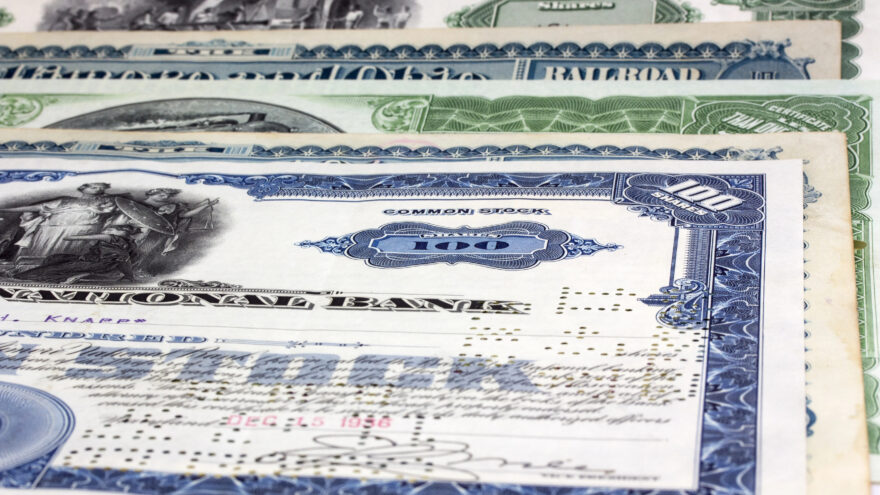When going through old documents, it’s common to sometimes find an old stock certificate, or share certificate. These physical certificates, once standard for investors, are now rare as most stocks are stored electronically. While some old certificates may belong to defunct companies and hold no financial value, others could be valuable. It’s worth investigating to see if your discovery is just a collectible or something you can still cash in.
What Is A Stock Certificate?
A stock certificate, or share certificate, is a document that represents ownership of a specific number of shares in a company. It serves as legal proof that the individual named on the certificate owns the indicated shares. While physical stock certificates were once common, most companies now use electronic records to track ownership, but the concept remains the same.
Key Features of a Stock Certificate:
- Name of the Shareholder: Identifies the individual or entity that owns the shares.
- Company Name: Specifies the issuing corporation.
- Number of Shares: Indicates how many shares the certificate represents.
- Certificate Number: A unique identifier for the document.
- Authorized Signatures: Typically includes the signatures of corporate officers.
- Date of Issuance: The date when the certificate was issued to the shareholder.
- Corporate Seal (if applicable): Some certificates may have a seal from the issuing company.
With the rise of electronic trading and the push for efficiency, most companies now use digital systems to track ownership. These systems are managed by brokerage firms or clearinghouses, such as the Depository Trust Company (DTC).
How To Find Value Of Old Stock Certificates
While physical stock certificates are becoming rarer, they can still sometimes hold their value, or other significance like sentimental and decorative purposes.
To find the value of old stock certificates, follow these steps:
- Check the Company Name
Look up the name on the certificate to see if the company still exists or has undergone mergers, acquisitions, or rebranding. - Search for Current Stock Information
Use financial websites like Yahoo Finance or Google Finance to check if the company’s stock is still publicly traded. Search using the company name or ticker symbol. - Research Corporate History
If the company no longer exists, research its history. It might have been bought out or merged. Look for details through online resources, libraries, or corporate registries. - Contact the Transfer Agent
The transfer agent listed on the certificate may provide information about the certificate’s validity or value. - Consult a Financial Professional
Reach out to a broker or financial advisor with expertise in old securities for assistance in verifying and valuing the certificate. - Determine Collectible Value
If the certificate has no monetary value as stock, it might have collectible value. Vintage stock certificates are often sought after by collectors for their historical significance or artistic design. - Use Online Resources
Websites like Scripophily.com specialize in researching and trading old stock certificates, offering valuation services for collectors and investors.
How Do I Cash Out Old Stock Certificates?
To cash out old stock certificates, follow these steps:
- Verify Ownership
Ensure the certificate is in your name. If not, you may need to provide proof of ownership, such as transfer documents or a will. - Confirm the Certificate’s Validity
Contact the issuing company or its transfer agent to confirm if the shares are still valid and active. The agent’s name is typically listed on the certificate. - Research the Company’s Status
Check if the company is still operating. If it merged, was acquired, or renamed, identify the successor company. - Open a Brokerage Account (if needed)
If you don’t already have a brokerage account, open one. Most brokers can assist with depositing paper stock certificates into an account. - Deposit the Certificate
Submit the certificate to your broker or the company’s transfer agent. You may need to complete forms and verify your identity. - Sell the Shares
Once the shares are credited to your brokerage account, you can sell them at the current market price. - Handle Inactive or Obsolete Certificates
If the company no longer exists or the certificate is invalid, it may have collectible value. Check with a dealer specializing in vintage stock certificates. - Pay Taxes on Gains
Keep records of the transaction, as any profit from selling the shares may be subject to capital gains tax.
Do Share Certificates Expire?
No, share certificates do not expire as long as the shares they represent remain valid. However, a certificate may lose its relevance if:
- The issuing company dissolves or ceases operations.
- Shares are sold or transferred, rendering the original certificate obsolete.
- The company switches to electronic record-keeping and eliminates physical certificates.
In such cases, shareholders may need to update their records or exchange the old certificate for a new one or electronic equivalent.
Have questions about old stock certificates’ value? Contact Zynergy Retirement today.

